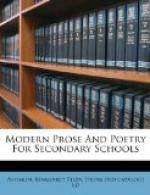Oomu otoko ni sowa sanu
oya wa,
Oyade gozaranu ko no kataki.
“The parents who will not allow their girl to be united with her lover; they are not the parents, but the enemies of their child.”
And song follows song; and the round ever becomes larger; and the hours pass unfelt, unheard, while the moon wheels slowly down the blue steeps of the night.
A deep low boom rolls suddenly across the court, the rich tone of some temple bell telling the twelfth hour. Instantly the witchcraft ends, like the wonder of some dream broken by a sound; the chanting ceases; the round dissolves in an outburst of happy laughter, and chatting, and softly-voweled callings of flower-names which are names of girls, and farewell cries of “Sayonara!” as dancers and spectators alike betake themselves homeward, with a great koro-koro of getas.
And I, moving with the throng, in the bewildered manner of one suddenly roused from sleep, know myself ungrateful. These silvery-laughing folk who now toddle along beside me upon their noisy little clogs, stepping very fast to get a peep at my foreign face, these but a moment ago were visions of archaic grace, illusions of necromancy, delightful phantoms; and I feel a vague resentment against them for thus materializing into simple country-girls.
NOTES
Lafcadio Hearn, the author of this selection, took a four days’ journey in a jinrikisha to the remote country district which he describes. He is almost the only foreigner who has ever entered the village.
=Bon-odori=:—The dance in honor of the dead.
=Hiroshige=:—A Japanese landscape painter of an early date.
=kuruma=:—A jinrikisha; a two-wheeled cart drawn by a man.
=hibachi=:—(hi bae’ chi) A brazier.
=Bonku=:—The Festival of the Dead.
=The memory of tropical dances=:—Lafcadio Hearn had previously spent some years in the West Indies.
=Akira=:—The name of the guide who has drawn the kuruma in which the foreigner has come to the village. (See page 18 of Glimpses of Unfamiliar Japan.)
=yukata=:—Pronounced yu kae’ ta.
=geta=:—Pronounced g[=e][=e]’ ta, not j[=e][=e]’ ta; high noisy wooden clogs. (See page 10 of Glimpses of Unfamiliar Japan.)
=Buddhist=:—One who believes in the doctrines of Gautama Siddartha, a religious teacher of the sixth century before Christ.
=Buddha=:—A statue representing the Buddha Siddartha in a very calm position, usually sitting cross-legged.
=Bodhisattvas=:—Pronounced b[=o] di saeht’ vas; gods who have almost attained the perfection of Buddha (Gautama Siddartha).
=Jizo=:—A Japanese God. See page 297.
=Etruscan=:—Relating to Etruria, a division of ancient Italy. Etruscan vases have graceful figures upon them.




